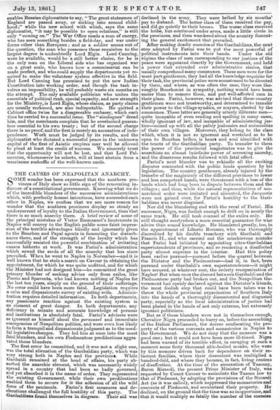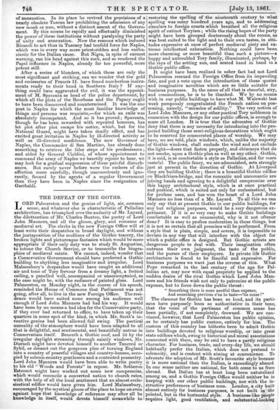THE CAUSES OF NEAPOLITAN ANARCHY.
SOME wonder has been expressed that the southern pro- vinces of Italy show so little sign of the renovating in- fluence of a constitutional government. Knowing what we do of the incredible blunders of the successive administrations which, with perfectly honest intentions, have succeeded each other in Naples, we confess that we see more reason for wonder that the southern provinces display so steady an undercurrent of loyalty to the Italian Government, than that there is so much anarchy there. A brief review of some of the principal mistakes of Victor Emmanuel's lieutenants in Naples will convey to the English public some faint impres- sion of the terrible advantages blindly and ignorantly given to the Bourbon and Papal agents in fomenting the disturb- ances there, and of the strength of the loyalty which has successfully resisted the powerful combination of irritating causes hitherto at work. It was Farini's administration which sowed the seeds of all the anarchy that has since prevailed. When he went to Naples in November—and it is well known that he stole a march on Cavour in obtaining the appointment, for which he was quite unfitted, and for which the Minister had not designed him—he committed the great primary blunder of seeking advice only from exiles, like Poerio and Spaventa, who had known nothing of Naples for the last ten years, simply on the ground of their sufferings. No error could have been more fataL Legislation requires a calm and dispassionate survey of existing evils. Adminis- tration requires detailed information. In both departments, any passionate reaction against the existing system is an element of great danger. In both departments, any deficiency in minute and accurate knowledge of persons and institutions is absolutely fatal. Farini's advisers were as ignorant as himself about the personnel and immediate emergencies of Neapolitan politics, and were even less likely to form a tranquil and dispassionate judgment as to the need- ful legislative changes. They led him at once into the most fatal blunders, and his own Piedmontese predilections aggra- vated those blunders.
The first error he committed, and it was not a slight one, was the total alienation of the Garibaldian party, which was very strong both in Naples and the provinces. While Garibaldi remained at the head of affairs, his party ab- sorbed the anarchic element, which was necessarily widely spread in a country that had been so badly governed, and yet absorbed it in the name of order. They represented the existing Government, while their own predilections enabled them to secure for it the adhesion of all the wild force of the peninsula. Farini's first measures and de- clarations challenged the full hostility of this party. The Garibaldians found themselves in disgrace. Their aid was declined in the army. They were bribed by six months' pay to disband. The better class of them received the pay, and did go quietly to their homes. The worse class received the bribe, but continued under arms, made a little circle in the provinces, and then wandered about the country foment- ing the general excitement that prevailed.
After making deadly enemies of the Garibaldians, the next step adopted by Farini was to put the most powerful of political instruments into their hands. Under the old regime the class of men corresponding to our justices of the peace were appointed directly by the Government, and held a power that extended over administrative circles, that usually comprehend many communes. These men were for the most part gentlemen, they had all the knowledge requisite for their task, the provincial police were accustomed to be directed by them, and where, as was often the case, they were tho- roughly Bourbonist in sympathy, nothing would have been easier than to remove them, and put well-affected men in their place. Farini, however, was advised that these country gentlemen were not trustworthy, and determined to transfer their power to the village syndics, or mayors, elected by the communes. These latter are generally utterly illiterate men— quite incapable of even reading and spelling in many cases, wholly ignorant of law, and incapable of administering jus- tice—mixed up with all the paltry jealousies and animosities of their own villages. Moreover, they belong to the class which, when it is not so ignorant and wretched as to be open to Bourbon bribes, is heart and soul identified with the tenets of the Garibaldian party. To transfer to them the power of the provincial magistrates was to give the anarchists an almost indefinite power of screening anarchy, and the disastrous results followed with fatal effect.
Farini's next blunder was to rekindle all the exciting disputes connected with the public lands question by his legislation. The country gentlemen, already injured by the transfer of the magistracy of the different provinces to lower and less competent hands, were threatened with a loss of the lands which had long been in dispute between them and the villages ; and thus, while the natural representatives of mo- narchical order were irritated and alienated, the Jacquerie were not gained over, for Farini's hostility to the Gari- baldians was never disguised. Nor did the blundering end with the recal of Parini. His successor, Nigra, was foolish enough to drift on in nearly the same track. He still took counsel of the exiles only. He still thought martyrdom a more essential guarantee for wise advice than sound knowledge. He blundered greatly, too, in the appointment of Liborio Romano, who was thoroughly discredited by his double treachery with Garibaldi and Francis II., and who carried out the mischievous mistake that Farini had initiated by appointing ultra-Garibaldian superintendents of provinces, and so rendering a disaffected party almost supreme in the interior. Had this policy been earlier pursued—pursued before the quarrel between the Dictator and the Piedmontese—had it, in fact, been pursued under Garibaldi's own superintendence—it might have secured, at whatever cost, the orderly reorganization of Naples:. But when once the discord between Garibaldi and the Piedmontese party had broken out, and the Neapolitan Go- vernment had openly declared against the Dictator's friends, the most foolish step that could have been taken was to throw the whole provincial organization of Southern Italy into the hands of a thoroughly discontented and disgusted party, especially as the local administration of justice had been placed in the hands of not only extreme, but extremely ignorant politicians. But as if these blunders were not in themselves enough, Chevalier Nigra proceeded to hurry on, before the assembling of the Italian Parliament, the decree confiscating the pro- perty of the various convents and monasteries in Naples to the Government. We do not deny that the measure was a good one ; but it could not have been more ill-timed. Nigra had been warned of its terrible effect, in enraging at such a moment some forty thousand able-bodied monks, who were by this measure driven back for dependence on their re- luctant families, where their discontent was multiplied a hundred-fold, and where they became, in fact, living centres of disaffection. At the time of the annexation of Tuscany, Baron Ricasoli, the present Prime Minister of Italy, was requested by Count Cavour to assimilate the Tuscan law to that of Piedmont, by adopting the provisions of the Siccardi Act (as it was called), which suppressed the monasteries and convents of Piedmont, and secularized their property. He declined, on the ground that the time was so inopportune, and that it would multiply so fatally the number of the enemies of annexation. In its place he revived the provisions of a nearly obsolete Tuscan law prohibiting the admission of any new monk or nun, without a distinct assent of the Govern- ment. By this means lie rapidly and effectually diminished the power of these institutions without paralyzing the party of unity and annexation. Now the reasons which induced Ricasoli to act thus in Tuscany had tenfold force for Naples, which was in every way more priest-ridden and less enthu- siastic for the Italian cause. But Nigra, in spite of earnest warning, ran his head against this rock, and so rendered the Papal influence in Naples, already far too powerful, more potent still. After a series of blunders, of which these are only the most significant and striking, can we wonder that the gold and emissaries of Francis II. have found numberless instru- ments ready to their hand in Southern Italy ? If any- thing could have aggravated the evil, it was the appoint- ment of M. Spaventa as head of the police department, by which all the plots of the Bourbons and the Papacy ought to have been discovered and countermined. It was the one post in Naples for which the most familiar knowledge of things and persons was requisite,—for which an exile was incompetent. ncompetent. And so it has proved ; Spaventa, though he has been rewarded with repeated honours, has let plot after plot escape his notice, which, but for the National Guard, might have taken deadly effect, and has excited great irritation in Naples by ill-directed activity as well as ill-directed confidence. The new Governor of Naples, the Commander di San Martino, has already done something to retrieve the false steps of his predecessors ; and aided by General Cialdini, of whose appointment to command the army of Naples we heartily rejoice to hear, we may look for a gradual suppression of these painful disturb- ances. But surely never before were the embers of dis- affection more carefully, though unconsciously and igno- rantly, fanned by the agents of a regular Government than they have been in Naples since the resignation of Garibaldi.































 Previous page
Previous page